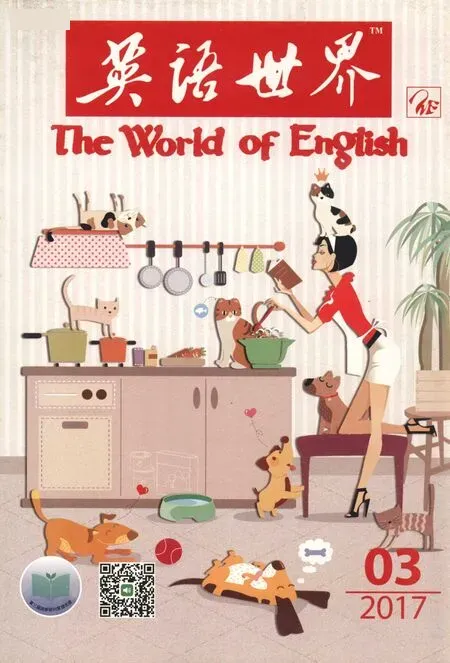《杀死一只仿声鸟》(节选四)
文/哈珀·李 译析/吴文安
《杀死一只仿声鸟》(节选四)
文/哈珀·李 译析/吴文安
We came to the street light on the corner, and I wondered how many times Dill had stood there hugging the fat pole, watching, waiting,hoping. I wondered how many times Jem and I had made this journey, but I entered the Radley front gate for the second time in my life. Boo and I walked up the steps to the porch. His fingers found the front door knob. He gently released my hand, opened the door, went inside, and shut the door behind him. I never saw him again.
[2] Neighbors bring food with death and flowers with sickness and little things in between. Boo was our neighbor. He gave us two soap dolls, a broken watch and chain, a pair of good-luck pennies, and our lives. But neighbors give in return. We never put back into the tree what we took out of it: we had given him nothing, and it made me sad.
[3] I turned to go home. Street lights winked down the street all the way to town. I had never seen our neighborhood from this angle. There were Miss Maudie’s, Miss Stephanie’s—there was our house, I could see the porch swing—Miss Rachel’s house was beyond us, plainly visible. I could even see Mrs. Dubose’s.
[4] I looked behind me. To the left of the brown door was a long shuttered window. I walked to it, stood in front of it, and turned around. In daylight, I thought, you could see to the post of fi ce corner.
[5] Daylight … in my mind, the night faded. It was daytime and the neighborhood was busy. Miss Stephanie Crawford crossed the street to tell the latest to Miss Rachel. Miss Maudie bent over her azaleas. It was summertime, and two children scampered down the sidewalk toward a man approaching in the distance. The man waved, and the children raced each other to him.
[6] It was still summertime, and the children came closer. A boy trudged down the sidewalk dragging a fishingpole behind him. A man stood waiting with his hands on his hips. Summertime, and his children played in the front yard with their friend, enacting a strange little drama of their own invention.
[7] It was fall, and his children fought on the sidewalk in front of Mrs. Dubose’s. The boy helped his sister to her feet, and they made their way home.Fall, and his children trotted to and fro around the corner, the day’s woes and triumphs on their faces. They stopped at an oak tree, delighted, puzzled, apprehensive.
[8] Winter and his children shivered at the front gate, silhouetted against a blazing house. Winter, and a man walked into the street, dropped his glasses, and shot a dog.
[9] Summer, and he watched his children’s heart break. Autumn again, and Boo’s children needed him.
[10] Atticus was right. One time he said you never really know a man until you stand in his shoes and walk around in them. Just standing on the Radley porch was enough.
[11] The street lights were fuzzy from the fi ne rain that was falling. As I made my way home, I felt very old, but when I looked at the top of my nose I could see fi ne misty beads, but looking crosseyed made me dizzy so I quit. As I made my way home, I thought what a thing to tell Jem tomorrow. He’d be so mad he missed it he wouldn’t speak to me for days. As I made my way home, I thought Jem and I would get grown but there wasn’t much else for us to learn,except possibly algebra.
我们来到街角的路灯处,我心想有多少次啊迪尔就站在那里抱着那根粗大的灯杆,张望,等待,满怀希望。我还想有多少次啊杰姆和我走过这段路,但走进拉德利家的前门,我这辈子才是第二次。布尔和我从台阶走上门廊。他用手摸到了前门把手,然后轻轻松开我的手,打开门,走进去,关上了身后的门。自那以后我再没见过他。
[2]邻居之间,有人去世会送食物,有人生病会送花儿,其他的事情送些小物件儿。布尔是我们的邻居。他给我们两块肥皂刻的娃娃,一只带链子的破旧怀表,一对象征好运的硬币,还有我们的生命。但邻居们都应回送一些东西。我们从树洞里取出东西,却从没有放回去什么:我们什么都没有给布尔,这让我感到伤心。
[3]我转身回家去。路边一排延伸到镇上的路灯不停闪烁。我从来没有在这个角度看过我们的街区。有莫迪小姐家、斯蒂芬妮小姐家、还有我们家,我能看到我家门廊上的秋千——蕾切尔小姐家离我们很远,也看得一清二楚。我甚至能看到杜博思太太家。
[4]我朝后看。棕色门的左边是一个长长的百叶窗。我走过去,站在窗前,又转过身来。我想,如果是白天,我能一直看到邮局那个拐角。
[5]白天……在我的头脑中,夜晚逐渐褪去。是白天,街区很繁忙。斯蒂芬妮·克劳福德小姐穿过街道,去跟蕾切尔小姐聊最新发生的事儿。莫迪小姐俯身照料她的杜鹃花。这是夏天,两个孩子蹦蹦跳跳地跑下人行道奔向一个从远处走来的男人。男人挥挥手,孩子们争先恐后跑向他。
[6]还是夏天,孩子们走得更近。一个男孩慢吞吞地沿着人行道走,身后拖着一根鱼竿。一个男人双手叉腰站在那里等他。还是夏天,他的孩子们在前院跟朋友玩耍,演出他们自己创作的一幕怪异小戏剧。
[7]画面又转到秋天,他的孩子们在杜博思太太门前的人行道上打闹。男孩把妹妹从地上扶起来,然后一起走回家。还是秋天,他的孩子们慢慢跑着经过拐角处,脸上写着一天的喜怒哀乐。他们在一棵橡树那里停下,又高兴,又迷惑,忐忑不安。
[8]冬天,他的孩子们站在前门口发抖,对面房子失火了,孩子的身影映衬在火光中。还是冬天,一个男人走到大街上,放下眼镜,射杀了一条疯狗。
[9]夏天,他看到自己的孩子们伤心欲绝。又是秋天,布尔的孩子们很需要他。
[10]阿迪克斯是对的。有一次他说,你永远都不会真正了解一个人,除非你穿上他的鞋子到处走。仅仅站在拉德利家的门廊上就足够了。
[11]细雨濛濛,街灯变得模糊起来。往家里走的时候,我感觉很苍老,但当我盯着鼻尖看,可以发现细小的雾蒙蒙的水珠,不过对眼看东西让我头晕,只好不再看。往家里走的时候,我在想明天要告诉杰姆什么。他错过了这些会发疯的,会好几天不跟我说话。往家里走的时候,我在想杰姆和我都会长大,但再也没有很多其他东西需要我们学,也许代数除外。
【背景知识】这是小说的最后部分。作者仍然从小姑娘的视角写景状物,排比句很多,文学色彩浓厚。从第五段到第十段都是小姑娘的想象和回忆,仿佛电影镜头,一幕幕情景交融,感人至深。
【第一段】斯科特送布尔回家,第二次走入布尔家的前门,感慨万千。段落中有两个排比句,译文应尽量保留。这是夜里,看不清,所以布尔found the front door knob译为“摸到了前门把手”。
【第二段】小姑娘回想过去,有些内疚。他们只是拿走布尔送的东西,却没有回送什么。因此心中翻江倒海,喟叹不已。
【第三段】斯科特站在布尔家的门口看周围,什么都尽收眼底。这也能解释布尔天天坐在家里,却能观察他们兄妹俩的一举一动。
【第五段】斯科特在想象布尔眼中的世界。两个孩子就是哥哥杰姆和斯科特,那个男人就是爸爸阿迪克斯。
【第六段】走得更近,指孩子们走得离布尔家更近。而所谓怪异的小剧目,是指从布尔的眼中看来,这些剧目较为怪异。因为这些讽刺布尔家的事情他不一定很清楚。
【第七段】仍然是斯科特设想布尔眼中的场面。布尔在橡树洞里放东西,然后观察孩子们的反应。
【第八段】街区上发生的事情都逃不过布尔的眼睛。邻居家失火了,布尔在背后观察,并且暗中帮忙。阿迪克斯射杀疯狗的英雄行为也看在眼里,所以布尔尊重阿迪克斯,爱护他的子女。
【第九段】这里是阿迪克斯看到孩子们很伤心,因为法庭辩护失败了。孩子们需要布尔,因为有人要伤害他们。
【第十段】短语stand in one’s shoes本意是“设身处地”,这里译者选取字面意义,因为两句话连续使用这一类比,读者能够看懂保留原文形象的译文。
【第十一段】该段情景交融,有三个排比句。小斯科特仿佛长大了,了解到世间的酸甜苦辣,感觉很苍老,除了课本知识,不需要更多了解社会了。
【小结】这一选段重点在于斯科特心理的描写。她从布尔家转过身来,设身处地,头脑中一幕幕场景纷至沓来,让她瞬间成熟长大。这些描述从侧面反映出作者对社会复杂性的点明(布尔家并非坏人)、对儿童幼稚行为的点破(演出戏剧嘲讽布尔家)以及对人性善恶的思索。译者需要从全书的背景来理解和翻译这一部分,否则译文可能不着边际,偏离作者本意。 □
To Kill a Mockingbird (Excerpt IV)
By Harper Lee

